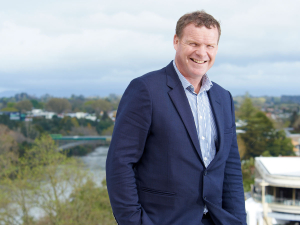Farmer confidence dips slightly, but positivity still dominates
Farmer confidence has taken a slight dip according to the final Rabobank rural confidence survey for the year.
 Rabobank’s Todd Charteris says the bank’s sustainability efforts are largely focused on supporting its clients to reduce their emissions.
Rabobank’s Todd Charteris says the bank’s sustainability efforts are largely focused on supporting its clients to reduce their emissions.
Rabobank says climate change creates both risks and opportunities for the bank and its clients and that the food and agriculture sector needs to recognise the potential for both.
Rabobank NZ chief executive Todd Charteris notes that the transition pathway for New Zealand food and agriculture will ultimately be driven by market access considerations, give our agriculture sector's dependence on regional and global trade.
"Transitioning to lower emissions intensity farming systems can support market access and can lead to improved efficiencies, reduced input costs and better profitabiltiy.
"Where appropriate, it can also support the growth ambitions of our clients within the context of increasingly stringent regulatory standards.
"The transition is also essential to us collectively managing the risks that we all share."
Charteris made the comments at the launch of Rabobank NZ's latest Sustainability Report covering the bank's end-to-end ambition for sustainability and highlighting its progress in the 2023 calendar year.
Rabobank says that, with its own operational improvements only moving the emissions reduction needle so far, its sustainability efforts are largely focused on supporting its clients to reduce their emissions.
"It is in our interests to do our bit to minimise the impacts of climate change. For us that means supporting New Zealand's farmers and growers to balance the priorities of providing food security to a growing world with reducing the impact agriculture has on the environment," says Charteris.
"Within our Climate Statements, we have assessed the relative risks and opportunities for Rabobank across a number of climate scenarios. It was a hugely valuable exercise that is increasingly informing the decisions we make as a bank.
"Many of our food and agri clients are also looking at climate scenarios for their own businesses, and we strongly encourage our clients who haven't as yet done this, to go through the same exercise."
The Sustainability Report outlines several initiatives undertaken by the bank to help transition its business, as well as those of its clients, to more sustainable business practices. Key initiatives highlighted include:
The report follows the publication of its Climate Statements on 30 April which focus on climate risk and opportunities in Rabobank's New Zealand business.
"As with our first Sustainability Report last year, this report provides a comprehensive view of our support and contribution to the rural sector and it's transition toward a more sustainable future," says Charteris.
"The report focuses on Rabobank New Zealand's local environmental, social, and governance (ESG) strategies and initiatives, and how these are contributing to our global commitments."
The World Wide Sires National All Day Breeds Best Youth Camp Best All Rounder plaudit has become family affair, with 2026 Paramount Cup winner Holly Williams following in her sister Zara's footsteps.
DairyNZ is giving New Zealand farmers a unique opportunity to gain hands-on governance and leadership experience within the dairy sector.
Herd improvement company LIC has posted a 5.2% lift in half-year revenue, thanks to increasing demand for genetics.
According to the latest Fresh Produce Trend Report from United Fresh, 2026 will be a year where fruit and vegetables are shaped by cost pressures, rapid digital adoption, and a renewed focus on wellbeing at home.
The Roar is a highlight of the game hunting calendar in New Zealand, with thousands of hunters set to head for the hills to hunt male stags during March and April.
OPINION: The past few weeks have been tough on farms across the North Island: floods and storms have caused damage and disruption to families and businesses.